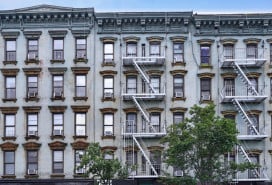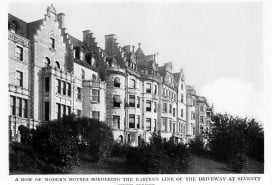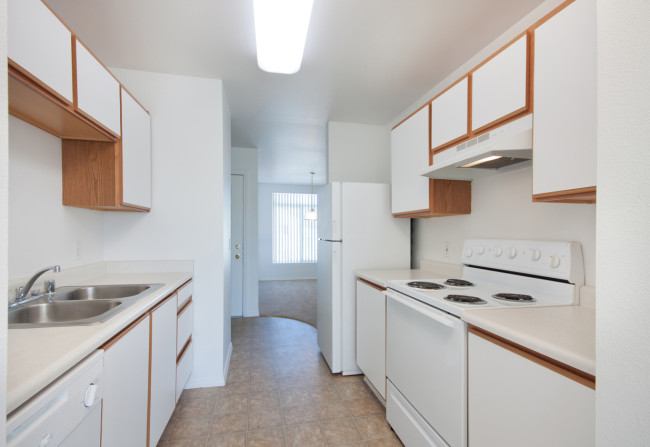Mansion or not, you can't escape the so-called mansion tax
- The mansion tax kicks in when you buy an apartment or single-family house for $1 million or more
- The fee starts at 1 percent of the sales price, rising to 4.15 percent on sales of $25 million-plus

One million dollars may only get you a small apartment in New York City—and still trigger the mansion tax.
iStock
Buying in New York City means paying painful extra costs, but nothing makes this as clear as the so-called mansion tax, which kicks in when you purchase a property for $1 million or more—even if the place you are buying is an apartment.
That's because the fee is based on the sales prices, not the type of property, and it starts at 1 percent of the purchase price. This state tax, which went into effect in 1989, applies to single-family houses, condos, and co-ops.
As a result of changes in the 2019 state budget, the fee is now scaled and rises incrementally to 4.15 percent on sales of $25 million or more.
The median sales price in Manhattan is just above the $1 million mark and it’s fair to say $1 million no longer buys you a mansion in NYC—for that amount buyers are more likely to end up with a one bedroom—so it’s a closing cost that is shouldered by many buyers.
The mansion tax, aka New York State Tax 1402-a, can increase your closing costs by thousands. It’s also possible you may have to pay it on a new development unit priced below a $1 million. That's because new development buyers pay state and city transfer taxes, which would raise the price tag and trigger the mansion tax.
[Editor's note: This article previously ran in May 2024. We are presenting it with updated information for April 2025.]
NYC buyers are stuck with the mansion tax
The only way to avoid the mansion tax is to buy a unit under $1 million.
For NYC properties priced above that amount, “there’s no such thing as avoiding mansion tax,” said real estate attorney Sandor Krauss, who acknowledged it can be painful to stomach. The tax rate for properties above $2 million is 1.25 percent. For properties above $3 million, it is 1.5 percent.
It's painful because the tax does not take into account NYC's high cost of living. In other parts of New York State, one could make the argument that a $1 million property is a luxury home, but here it may buy you an alcove studio or a one bedroom.
Pursuing a buyer’s broker commission rebate
On units close to $1 million, there’s a slim chance of avoiding the tax. In theory, a buyer’s broker commission rebate might just work. “The broker can lower their commission and give that credit to the buyer—that’s a possibility if the broker will agree to do that,” Krauss said. But in practice it is unlikely.
Can you ask the seller to pay the mansion tax?
When buyers have the upper hand—like the ability to pay all cash in a sluggish market—it’s possible they can ask the seller to pay the mansion tax but this is rarely successful. The math just doesn’t bear out, especially as the cost is not tax deductible and so has no impact on a tax return.
State and city transfer taxes can trigger the mansion tax
Typically the seller pays the state and city transfer taxes, but in some cases that cost is put on the buyer and is then reflected in the recorded sales price. This happens most frequently in new development and Krauss said it can mean buyers of units below $1 million can find themselves subject to the mansion tax.
“Let’s say you enter into a contract of sale for $990,000, that would avoid the mansion tax in a normal circumstance, but the way new development works is that you take that 1.825 percent, which is $18,067.50, and you add that to the $990,000 so now your consideration is $1,008,067.50 and you’re going to pay a mansion tax,” he said.
Using a furniture credit may backfire
You may have heard suggestions a buyer can apply part of the price to purchase the owner's furniture or art to keep a unit below $1 million, but Krauss warned against it.
“If you are trying to get away with avoiding the tax by saying, ‘I’ll buy your apartment for $995,000 and then I’ll give you a check for $7,000 for your furniture,’ you may get audited and asked whether you filed a sales tax return on that furniture. It’s one of those ways that people get caught,” he said.
The risks of ducking the mansion tax
Which brings us to the risks associated with trying to avoid the mansion tax.
“The NYC Department of Finance can ask for supporting documentation that subjects you to an audit and if they prove your sales price was more than a $1 million, not only can they make you pay that mansion tax, but they could ultimately issue fines and penalties for not paying it on time,” Krauss said.





























